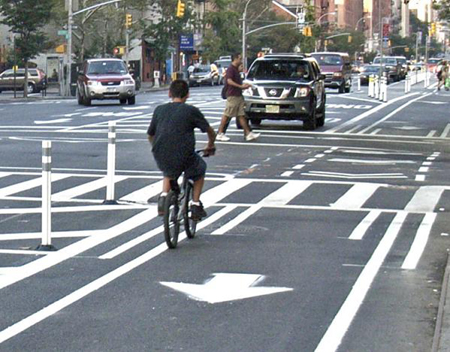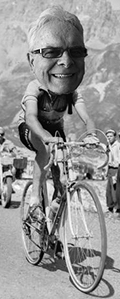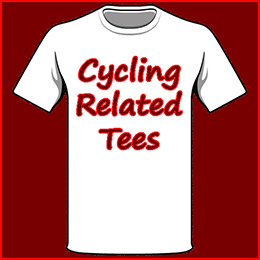Education or Enforcement
 Thu, April 7, 2011
Thu, April 7, 2011 
There are two ways to apply cycling laws, education or enforcement. Going to school in the UK at least twice a year there would be a special lesson on the Highway Code.
A little Highway Code book would be given to us to take home and keep. It not only had all the rules and laws as applied to driving a car, it laid out those that applied to riding a bicycle and pedestrians.
It was drummed into us, when you cross the street, stop, look right, look left, look right again; (Traffic came from the right in the UK.) if the road is clear then cross.
This was war time Britain of the 1940s and due to petrol rationing there were few cars on the road, especially in the rural area I lived at the time. Never-the-less when we crossed the street we went through this ritual of look right, look left.
There were cycling proficiency tests too, where we would bring our bikes to school and the local police constable would come in and instruct us on how to ride our bike both safely and in compliance with the law.
The result was when I started cycling seriously in the 1950s, I never rode on the pavement, (Sidewalk.) I never rode through red lights, and my bike always had a front and rear light when riding after dark. As for riding a bike on the wrong side of the road, toward traffic, that would be so crazy it would not even be considered.
It was somewhat of a culture shock when I came to the US in 1979 and went for a ride with the local club. The first red light we came to I stopped and everyone else kept going.
It would not be unusual to find a cyclist riding towards me on my side of the road. This led to the quandary, do I pull out in the traffic lane and let him pass on the inside, or hold my course and hope he goes around me? I usually took the initiative and went for the first option.
I remember reading of a case in New Jersey where two cyclists riding at night without lights hit head on because one was on the wrong side. Their heads hit, neither was wearing a helmet; one died instantly, the other had serious head injuries.
Young kids on BMX bikes would jump from the sidewalk to the center of the road, and then wait for a gap in opposing traffic before hopping over to the opposite sidewalk. It was a free for all, with no rules being observed or enforced. Today, from what I read, it is no better in the UK; it seems the Highway Code is no longer taught in schools.
Stuff drummed into me as a kid has stayed with me to this day; so believe me I understand why some cyclists ride through red lights. It is what they have always done since they were a kid; no one said they shouldn't do it.
If I stop for a red light, even if there is no other traffic in sight, it is not because I am somehow better than the cyclist who just rides on through. It is because not to stop feels uncomfortable, and goes against a lifetime habit.
Getting in the habit of obeying traffic laws while riding a bike would be a good thing for all cyclists to do right now. I am reading of a ticket writing blitz going on in Brooklyn, New York; it will not surprise me if this happens in other cities in the US as cycling becomes more popular and more and more cyclists take to the streets.
The article in The Brooklyn Paper tells how critics are saying it is unfair to clamp down on cyclists in this manner. I am inclined to agree to a certain extent. It is unfair that a cyclist should pay the same $190 fine for running a red light that a motorist has to pay.
However, it is quite simple to avoid getting one of these tickets; don't run red lights. Also, whoever said life is fair? It is unfair that I am forced to take my shoes off at the airport, because one idiot tried to blow up a plane with a bomb in his shoe.
One Brooklyn cyclist got three tickets; one for riding his bike on the sidewalk, another riding against the flow of traffic, and a third for mouthing off to the cop who was giving him the ticket. All three of these tickets could have been avoided, had this particular cyclist not become accustomed to riding his bike where ever and however he please.
Laws regarding cyclists running red lights and other infractions are in place everywhere right now, so too are fines set. Because the police have not enforced these laws in the past, it may seem unfair when they suddenly start issuing tickets.
There are ways to get people to follow the rules. You educate, preferably at an early age as happened with me, it then becomes a lifetime habit. Or you start fining people as a deterrent.
I find obeying the law as I ride my bike, does not affect my cycling pleasure; it does not slow me down all that much either. And if my local law enforcement starts issuing tickets to cyclists, it will not affect me.
Those who get tickets will no doubt say how unfair it is, and how they’ve always ridden on the sidewalk or went through red lights. I may sympathize, but I doubt I will be offering to pay their fine.























Reader Comments (22)
Dave, I suscribe to your blog and read it regularly with great appreciation. As an American cyclist who shares your respect for safe and law-abiding cycling, I applaud your column today. I have made my own comment on my blog which I posted a few minutes ago. I included links to your statement and copied the first part of your post as further encouragement to my readers to follow the link so that they can read all of what you say, both today and in your continuing commentary on cycling. I hope that my copying of a portion of your column is OK. If not, let me know and I will take it down. http://keithwatkinshistorian.wordpress.com/2011/04/07/wanted-more-bicyclists-who-obey-traffic-laws/
Keith
Keith,
No problem, I added a link to your blog.
Dave
Hi Dave,
I think this is a great column. I routinely lament the chaotic and generally dangerous behaviour of urban cyclists in Ottawa. I think early-and-often education outlining expectations and responsibilities would go a long way to bettering the situation - not only teaching proper practices, but raising awareness and understanding of other road users.
Regards,
Neil
Dave
Great post. I remember taking the Cycling Proficiency Test in England when I was a kid. You got a red and green triangular metal badge for passing I recall. Nowadays it would probably infringe some politically correct health and safety rules to teach kids to ride bikes properly :-).
Dave,
You're certainly right that cyclists should obey the rules of the road, inasmuch as cars do (i.e. not everywhere, all the time), but it's sometimes not easy here in states as the whole transportation system is so anti-cycling it's absurd. While I do try to stop at red lights and stop signs, I do admit that if no one's coming I usually roll through (I do prepare for stopping, however). For some reason, we have an over-abundance of traffic lights and stop signs every-damn-where in the states (a STOP sign @ every! little intersection? really not necessary) and if I were to truly stop at each and every one, well then I'd never get anywhere. Do I run red lights in traffic? No - I'm not stupid, but I do admit to rolling through when no cars are coming. Is that unsafe? Some would say yes, but you can get hit by a car just standing there, too (it's happened to me). Nothing's ever 100% safe.
Actually there IS an updated version of the old cycling proficiency test - it's called Bikeability. Kids at primary school level are taken out on their bikes by instructors and taught how to cycle safely.
Sadly, there is a slight issue with the definition of "safely". Substitute it for "somebody that has no rights to the road, and who must always yield to everybody and everything" might be closer to the mark!
David R,
You can justify going through red lights with the safe to do so argument, but if cops in your area start giving out tickets, good luck with making that argument in court. The lady in the Brooklyn Paper article tried and failed.
Dave
Bravo! Could not agree more Dave. It's not hard to obey basic, simple traffic laws. They ensure everyone at least has a fighting chance of anticipating what other road users are going to do (most of the time anyway.) It's for this reason that I give hand signals when turning.
The light's a great motivational tool to ride harder or an excuse to rest. It's win-win, as far as I'm concerned.
Education is important. I try to follow the rules, but there are some gray areas of the law and bike safety, particularly in keeping to the right side of the road.
A) do I cross over (possibly two lanes of) traffic to use a left turn lane?
B) if using a left turn lane (or coming from a single lane in your direction) onto a multi-lane street, you break a rule whether you take the inside lane or change lanes mid-turn to stay right.
C) Avoiding the right hook (to say nothing of letting people make right turns at a stop), means being in the wrong lane.
I once had a heated discussion with some gentlemen about that last one at a traffic light, although with a can of beer in the cupholder (at 9am!), I don't think they were in any position to argue traffic law with me. Suffice it to say, the authorities were alerted to the car's make, model, and license plate number.
I don't believe personal actions would have affected DavidR's vulnerability to the inattention of another.
I have a midway position on this. I like to see a general sense of order, but at the same time I recognise that the current system of order is designed around motor vehicles, and is not well-tuned to the needs of cyclists.
So I always stop at red lights, but I don't always stay stopped at them. Sometimes it's so clearly safe to continue through the intersection that I do, and I think the only thing wrong here is that the law is being applied equally to cyclists and motorists when their circumstances are so different.
So yes, follow the rules, but first let's make the rules make sense. Following rules blindly is never a good idea, and didn't work as an excuse at Nuremburg.
I agree wholeheartedly that we cyclist should obey traffic laws. We can't demand the respect of drivers while disregarding traffic laws. I like bike lanes, I like feeling safe while riding through the streets of DC. I like riding fast on the surrounding suburban roads. But when I approach a light I know I have to stop. If we as cyclist blow through red lights, ride against the flow of traffic and on the sidewalk, then we give up our right to be treated as equals. We can not have it both ways. We either go back to the days of no bike lanes and motorists having a lesser awareness of us or we agree to abide by the laws. That being said, the current backlash against cycling should note that a minority of law breaking cyclist does not represent the whole truth of the situation. There have been numerous articles, mostly in New York publications, demonizing the urban cyclist for the actions of a few. A few incidents of motorist road rage does not result in the public or media viewing all drivers as crazy, volatile and dangerous. But I guess that's difficult when the majority of people are motorist and would therefore have to view themselves as crazy and volatile and dangerous if they made that connection. I guess the fact that cyclist are a minority allows for the difference in using the same logic to come to arrive at a conclusion.
Dave, Unfortunately, you are right, there is little, if any, observance of the law or 'rules of the road' by cyclists in the UK these days. Even Club runs seem to feel it is ok to filter through traffic lights on red. And as for riding on the pavement, don't even get me started on it. People just seem to think they can do just what they want with no sense of responsibility!
Geoff, Tring UK
Agree that group "fun rides" (those are what are supported by local cycling advocates) are unattractive because they incentivize group behavior that breaks laws. But realize that road users (cyclists, motorized, pedestrian) reflect the quality of their environment and built designs. Make the rules and road designs more sensible first then aberrant behavior can be fairly criticized and punished.
Here is just one example on how to do improve road design so that all road users can be treated fairly:
http://www.youtube.com/watch?v=FlApbxLz6pA&feature=player_embedded
In law enforcement, the definition for service is education, prevention and enforcement. Engineering is also a strong piece for problem solving. Bicycle safety and law education should be included in every public and private drivers education and should be given by a police officer. Why...? Because the 14-16 year old students will listen if a cop gives the education and the regular instructor will gloss over the information because, after all, the students are there to learn driving not bicycling.
Education must become before enforcement accomplished anything. And I write a lot of tickets to drivers and bicyclists who run afoul of each other.
Great blog, Dave.
In discussing speed enforcement problems with the Captain of our local PD on a neighborhood corner, he explained that "all drivers do it, so what's the big deal. We don't have enough time and officers to enforce these laws".
A few of the neighborhood kids between the ages of 12-16 stood nearby and listened. Afterwards they said they were shocked that those who serve as the front line of law enforcement had such little respect or consideration for others, particularly the more vulnerable non-motorized road users. It was no surprise to me, I witness these problems daily as a cyclist, pedestrian and driver.
These young minds got an education on "Respect-Consideration-Fairness"
Damn it Dave. Red lights?! Don't you know there is a war on and people are homeless???
oh sorry, wrong post....<slinks away>
Great post, straight and to the point, it will no doubt infuriate the cool brigade!
Rights go hand in hand with responsibility, for motorists AND cyclists. It's really as simple as that.
Education v Enforcement or Creating Mutual Respect?
Here's one that claims it's about education: "I think reasonable cyclists and reasonable drivers could come together to find ways to reduce inbred hostility and to recognize that at least some of the warfare going on is due to misunderstanding and ignorance, as opposed to ill will."
However his first point that cyclists are "hypersensitive to insult or incursion, resistant to giving benefit-of-the-doubt to drivers, and so intensely ideological as to be unable to separate friends from enemies" is simply wrong IMO. Most cyclists are divers too but few drivers are cyclists:
http://lefthandview.wordpress.com/2011/04/08/04-08-11-bikes-cars-lessons-learned/
Education AND Enforcement.
I'm with you on the recognition of the need for and the absence of cyclist education in the USA.
Thank you for the frequent reminders.
thank you very much for the information. really informative and helpful.
I found one successful example of this truth through this blog. I am going to use such information now.